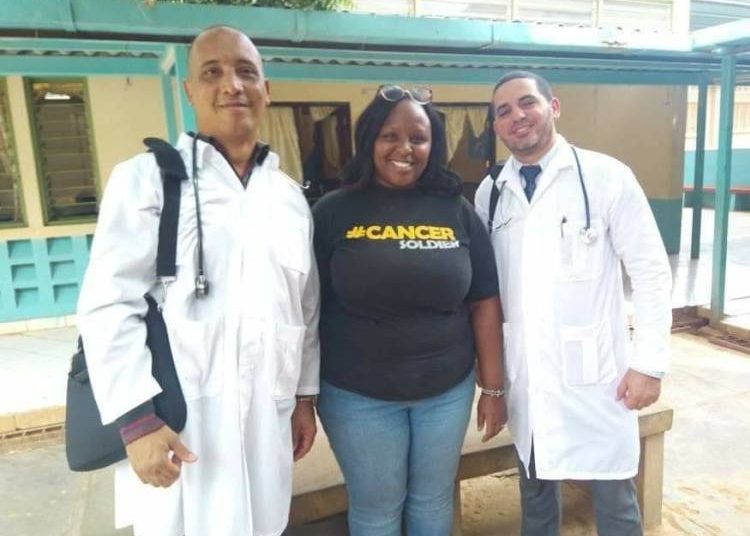The two Cuban doctors kidnapped in Kenya by alleged members of the Somali jihadist group Al-Shabaab this Sunday celebrated nine months in captivity, while the Kenyan government insists that they are “well” and is working on getting them released.
“We know for sure that they are well, but the plan to guarantee their rescue continues. We want to rescue them alive so they can reunite with their families,” Kenyan Executive spokesman Cyrus Oguna confirmed to EFE news agency.
Oguna thus reiterated the position that the Kenyan authorities have maintained for months on the status of surgeon Landy Rodríguez and general medicine specialist Assel Herrera Correa, kidnapped on April 12 by alleged members of Al-Shabaab in the city of Mandera, near the border with Somalia.
The doctors are well, but without proof that they are alive
Despite insisting that the doctors are “well” somewhere in Somalia, to date neither the Kenyan government nor the kidnappers themselves have provided proof that they are alive.
In that regard, the government spokesman was in favor of discretion and stressed to EFE that he cannot disclose the “whereabouts” of Rodriguez and Herrera for “security” reasons.
“What will happen if we say where they are?” he insisted. “They can be moved to another site. Therefore, we know where they are but we cannot reveal it for the safety of the operation and the situation in which they find themselves.”
Asked if the kidnappers have demanded the payment of a ransom in exchange for the freedom of the doctors, Oguna was blunt: “No, as far as I know,” he replied.
Last May, elders from Kenya and Somalia who traveled to the Somali region of Jubaland, controlled by Al-Shabaab, to negotiate for the Cubans, said they saw the doctors alive and providing medical assistance to the local population.
According to those traditional leaders, the kidnappers had even demanded a ransom of some 1.5 million dollars as a condition for their release, the Kenyan press then reported.
In any case, Oguna clarified that the Kenyan government follows a very clear policy in these cases: “Never negotiate with terrorists. That is our position and that has never changed,” he stated.
Meanwhile, the Cuban ambassador to Kenya, Ernesto Gómez Díaz, assured EFE that, for the time being, there is “no” news about the fate of Rodríguez and Herrera.
“Everything stays absolutely the same. We have nothing, neither forward nor backward. We are in the same place. We don’t lose hope,” added the ambassador.
On December 30, Cuban President Miguel Díaz-Canel spoke with his counterparts in Kenya, Uhuru Kenyatta, and Somalia, Mohamed Abdullahi Mohamed, about “the efforts for the safe return to the homeland” of the doctors, as indicated in his official Twitter account, without giving more details.
Also in that month, Cuban Deputy Prime Minister Inés María Chapman said after returning from Kenya, where she participated in a summit of the ACP countries (Africa, Caribbean and Pacific), that the Kenyan government ratified that the doctors “are well.”
Kidnapping in Kenya and captivity in Somalia
The two doctors were going to the Mandera hospital accompanied by armed guards when they were intercepted and kidnapped on April 12, 2019, after a shooting in which one of the guards protecting them died.
After the attack, Kenya mobilized commands from the LRS elite army brigade, specialized in gathering information in hostile territory, in order to support the police and military to catch the kidnappers, who crossed into Somalia with the doctors.
The Kenyan government believes that the kidnapping was carried out by militants of Al-Shabaab, a Somali group that joined Al Qaeda in 2012 and often carries out raids in neighboring Kenya as retaliatory attacks for the presence of its army in Somalia.
The kidnapped doctors are part of a contingent of 100 Cuban professionals―including radiologists, plastic and orthopedic surgeons, neurologists and nephrologists―who arrived in Kenya in 2018 under a bilateral agreement to improve access to specialized health services in the African country
After the kidnapping, the Kenyan authorities relocated to safer areas Cuban doctors deployed in Kenyan counties bordering Somalia, where Al-Shabaab seeks to establish a kind of Wahhabi (ultraconservative) Islamic state.
Since the overthrow in 1991 of dictator Mohamed Siad Barre, Somalia is a country shaken by conflict and chaos, without an effective government and in the hands of Islamist militias and warlords.










